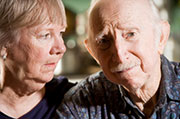- Could Your Grocery Store Meat Be Causing Recurring UTIs?
- Are You Making This Expensive Thermostat Error This Winter?
- Recognizing the Signs of Hypothyroidism
- 10 Strategies to Overcome Insomnia
- Could Artificial Sweeteners Be Aging the Brain Faster?
- Techniques for Soothing Your Nervous System
- Does the Water in Your House Smell Funny? Here’s Why
- Can a Daily Dose of Apple Cider Vinegar Actually Aid Weight Loss?
- 6 Health Beverages That Can Actually Spike Your Blood Sugar
- Treatment Options for Social Anxiety Disorder
After Stroke, Spouse May Also Need Care


If your spouse has a stroke, and the two of you disagree about the rate of recovery, your own health might suffer, a new study finds.
The caregiving spouse is at increased risk for emotional distress and depression if the couple has different perceptions of the post-stroke progress, researchers found.
Stroke care needs to switch from focusing only on the patient to regarding the patient and spouse as one unit, suggested Michael McCarthy, a social work researcher at the University of Cincinnati.
“How the spouse is doing matters in the equation,” McCarthy said.
“They need as much care, if not more in some ways, as the patient,” he added. “We need to bring partners together in the rehabilitation process, to align each person’s expectations and perceptions in order to achieve the best outcomes.”
His study included 35 couples in which one spouse had suffered a stroke within the past three years. The patients and their spouses were interviewed separately about the stroke survivor’s recovery, including their ability to do daily tasks, and their memory and problem-solving skills.
Compared to the stroke survivors, the spouses felt that the recovery was going much slower. This difference was associated with depression in the spouses.
“So if the wife has a stroke and she believes, for example, that she can still drive but her husband doesn’t — the difference in their perception is predictive of the husband’s emotional distress,” McCarthy said in a university news release.
“We were able to quantify and capture a different kind of worry and stress that caregiving spouses can experience and connect it to their outcomes,” he added.
The study was recently published online in the journal Aging & Mental Health.
The degree of difference in how couples view stroke recovery is important in assessing the risk of depression in spouses of stroke survivors, said McCarthy. And if a spouse develops depression, it can “cycle back” onto the stroke survivor, he noted.
Some evidence suggests that wives may be particularly susceptible to worry in such cases, as well as spouses in strong, fulfilling relationships, McCarthy said.
More information
The U.S. National Library of Medicine has more about stroke rehabilitation.
Source: HealthDay
Copyright © 2026 HealthDay. All rights reserved.










